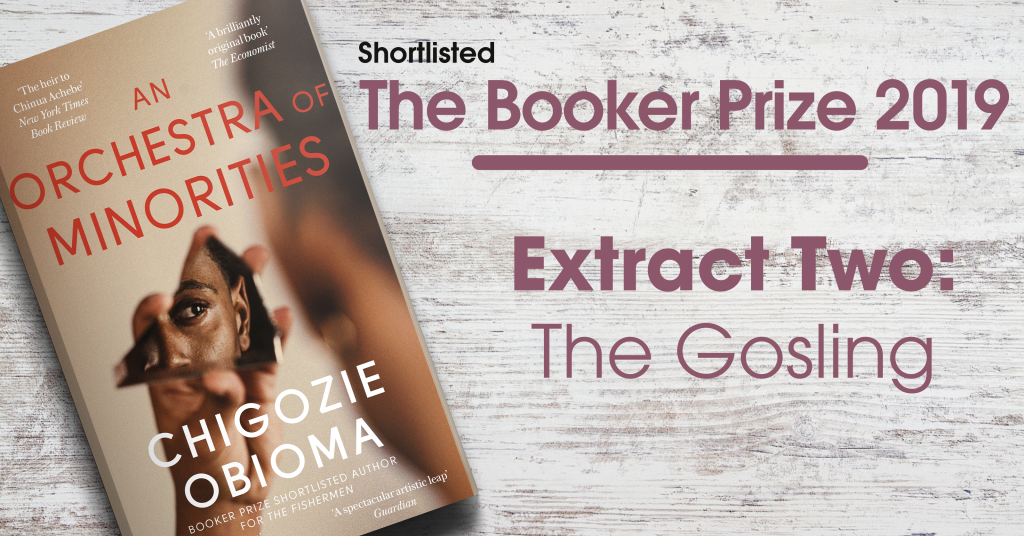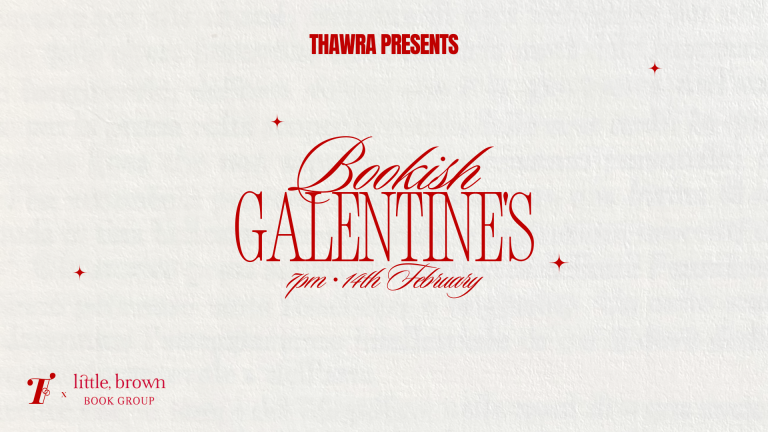An Orchestra of Minorities: Extract #2

The Gosling
ANUNGHARINGAOBIALILI, when a man encounters something that reminds him of an unpleasant event in his past, he pauses at the door of the new experience, carefully considering whether or not to go in. If he has already stepped in, he may retrace his steps and reconsider whether to re- enter. Like my host, every man is inextricably chained to his past and may always fear that the past might repeat itself. So, with Motu still fresh in his mind, my host attended his desire for this woman with caution. He observed that she’d changed so much – as if she were not the same woman who had been mired in grief the night he first met her, at the bridge. She was taller than he remembered from that brief encounter. Her eyes were framed by a delicate arc, and her forehead shone from the backwards pull of her permed hair.
She reappeared more beautiful than the image he’d stored in his mind for so long. She came up to him after fuelling her car and shook his hand and introduced herself as Ndali Obialor in the language of the White Man, as she’d done on the bridge. He told her his name, too. He found her intimidating, not only her presence but also her facility with this language, which he rarely used. He was curious how she had been able to recognise him.
‘Your vehicle, the sign on it, OLISA AGRICULTURE,’ she said, laughing. ‘I remember it. I saw you a month or so ago, near Obi Junction. But you were driving very fast. I just believed I would see you again.’ A car honked for her to step out of the way, and when it had passed, she said, ‘I’ve been looking for you. To thank you for that night. Thank you, really.’
‘Thank you, me also,’ he said.
She’d closed her eyes while speaking, and opened them now. ‘I am going to school now. Can you come to Mr Biggs?’ She pointed at the eatery on the other side of the road. ‘Can you come there by six o’clock today?’
He nodded.
‘Okay, Chinonso. Bye- bye. Good to see you again.’ He watched her retrace her steps back to her car, wondering if all this while he had been looking for her he’d seen her without knowing it.
He’d seen in the woman’s eyes something – something he could not himself define. There are times when a man cannot fully understand his feelings, and neither can his chi. His chi is often at a loss at those times. Hence this mystery hung like a small cloud over him as he went home to prepare for the meeting with her later that day. What was clear to me and to him was that she was not like anyone else he’d met. The accent she affected was of a person who had lived in the foreign countries of white people. And there was a lushness to her demeanour and appearance that was nothing like the ramshackle outlook of Motu or the strange mixture of poise and feistiness of Miss J. And, Egbunu, when men meet those whom they esteem highly above themselves, they become measured in their actions, they check themselves, they try to present themselves before these people in a way that will earn them dignity. I have seen it many times.
So when he got home, he spread two sacks on the ground and poured millet and maize on them, then he unbarred the coops of the adult fowls. They rushed out and covered the sacks. In haste, he filled the water troughs and put them back in each of the cages. He brought out one of the suits he’d inherited from his father. With a sponge he’d cut a few days before from a grain sack, he brushed off a stain on the suit. Then he hung it to dry on a branch of the tree in the yard. He washed himself and was about to bring in the suit when it struck him that his hair was bushy. He had not cut it in nearly three months, since that day when Motu, insisting she could do it, cut it with scissors and he swept the yard in a frenzy afterwards, fearing one of his flocks would eat a strand of the hair. In haste, he drove to the salon on Niger Road, where he’d gone since he was a child. The man, Mr Ikonne, his barber, had suffered a stroke, and the man’s eldest son, Sunday, now did it. When my host’s turn came and Sunday began cutting his hair, the clipper went quiet suddenly. Seeing there had been a power outage, Sunday rushed to the back of the shop to put on the generator, but it would not start. My host glanced at himself in the mirror: half his head was cleanly shaved; the other half was full of tangled, bushy hair. He gazed about, stepped out of the swivelling chair, and sat back again. He was in flux, anxious, for the moving clock – the strange mysterious object with which the children of the fathers now measure time – showed that it was close to the hour when he should meet the woman.
Sunday came in a bit later, his hands black from working the generator, his shirt soaked in sweat, his trousers smeared with black dirt. ‘I am sorry,’ he said. ‘The generator has developed a fault.’
My host’s heart sank. ‘Is it fuel?’
It was not, Sunday told him. ‘It is the ignition. It is the ignition. I need to take it to a rewire. I am very very sorry, Nonso, we will finish the haircut any time NEPA restores power, oh. Or tomorrow after I repair the gen. Biko eweliwe, Nwannem, oh.’
My host nodded and said in the language of the White Man, ‘No problem.’ He turned back to the darkening mirror and gazed at his half- shaved head. Sunday unhooked a hat from the many on the wall and gave it to him. He wore it and headed for the restaurant.
EGBUNU, one of the most striking differences between the way of the great fathers and their children is that the latter have adopted the White Man’s idea about time. The White Man reckoned long ago that time is divine – an entity to whose will man must submit. Following a prescribed tick, one will arrive at a particular place, certain that an event will begin at that set time. They seem to say, ‘Brethren, an arm of divinity is amongst us, and it has set its purpose at twelve forty, so we must submit to its dictates.’ If something happens, the White Man obliges himself to ascribe it to time – ‘On this day, July twentieth, 1985, such- and- such happened.’ Whereas time to the august fathers was something that was both spiritual and human. It was in part beyond their control and was ordered by the same force that brought the universe into existence. When they wanted to discern the beginning of a season or parse the age of a day or measure the length of years, they looked to nature. Has the sun risen? If it has, then it must be day. Is the moon full? If it is, then we must gather our best clothing, empty our barns and get ready to celebrate the new year! If in fact the sound we hear is thunderclaps, then surely
the drought must have ended and the raining season must be upon us. But also, the wise fathers believed that there is a part of time that man can control, a means by which man can subject time to his own will. To them, time is not divine; it is an element, like air, that can be put to use. They can use air to put out fires, blow insects out of people’s eyes, or even cause flutes to produce music. This is the same way that time can be subject to the will of man – when a group among the fathers says, for instance, ‘We, the elders of Amaokpu, have a meeting at sunset.’ That time is expansive. It could be the beginning of sunset, or its middle, or its end. But even this does not matter. What matters is that they know the number of those coming to the meeting. Those who arrive ahead of others wait, talk, laugh until everyone is there, and that’s when the meeting begins.
It was thus following the prescribed tick of the clock that she got there before him. She looked even better than she’d looked earlier, wearing deep red lipstick that reminded him of Miss J and a dress that had leopard prints on it.
After he sat down and adjusted his cap to make sure it concealed every part of his head, she said, ‘Eh, Nonso, I want to ask you: why did you go to that bridge at that very moment and stop?’ As he made to answer, she raised her hand, her eyes closed. ‘I really want to know, really. Why did you go there at that very time?’
He raised his head to look above her, to the ceiling, to avoid her eyes.
‘I don’t know, Mommy,’ he said. He picked his words with care, for rarely did he have to speak in the language of the White Man. ‘Something just pushed me there. I was coming from way back in Enugu, and then I saw you. I just say let me stop.’
He glanced out of the window, allowed his eyes to fall on a child rolling a motorcycle tyre along the road with a stick, trailed by other children.
‘You saved my life that day. You will never—’
The ringing of her phone made her pause. She unwrapped it from a handkerchief in her purse, and on seeing the screen she said, ‘Ah! I was supposed to go somewhere with my parents now. But I forgot before. I am so sorry, but I have to go now.’
‘Okay, okay—’
‘Where is your poultry? I would like to see it. What street?’ ‘It is number twelve Amauzunku, off Niger Road.’
‘Okay, give me your number.’ He leaned in towards her and listed the numbers in their order. ‘I will come there one of these days. I will call you, later, so we can meet again.’
Because I could see in my host the beginning of the growth of that great seed that bears strong root downwards in the soul of a man and bears fruit upwards – the fruit of affection that becomes love – I came out of him and followed the woman. I wanted to know what she would do – if she would remain and not vanish, as the previous woman had done. I followed this woman in her car as she drove, and I saw on her face an expression of joy. I heard her say, ‘Chinonso, funny man,’ and then laugh. I was watching, curiously observing, when from within her something floated out, like a thick- formed steam rising. And within the batting of an eyelid, what stood before me was a spirit whose face and appearance were exactly like the woman’s, save for her luminous body, covered with uli symbols, and her extremities, graced with beads and strings of cowries. It was her chi. Even though I’d been told many times at the caves of spirits that the guardian spirits of the females of mankind possessed more powers of sensitivity, I was astonished at how it was able to see me while still in the body of its host.
—Son of the spirits, what do you want from my host? the chi said in a voice as thin as that of the maidens who dwell on the road to Alandiichie.
—Daughter of Ala, I come in peace, I come not with trouble, I said.
Chukwu, I saw that the chi, who was clothed in the bronze skin of light with which you drape the guardian spirits of the daughters of mankind, regarded me with eyes that were the colour of pure fire. She had begun to speak when her host honked and pulled to a sudden stop, shouting, ‘Jesus Christ! What are you doing, Oga. You no sabi drive?’ The car that had veered in her way turned towards another street, and she continued on, sighing loudly. Perhaps now certain her host was fine, the chi turned back to me and spoke in the esoteric language of Benmuo.
—My host has erected a figurine in the shrine of her heart. Her intentions are pure as the waters of the seven rivers of Osimiri, and her desire is as true as the clean salt beneath the waters of Iyi- ocha.
—I believe you, Nwayibuife, guardian spirit of the dawn light, daughter of Ogwugwu, and Ala, and Komosu. I only came because I wanted to be sure that she desires him, too. I shall return with your message to comfort my host. May their union bring them fulfilment in this cycle of life and in the seventh and eighth cycles of life – Uwa ha asaa, uwa ha asato!
—Iseeh! she said, and without a moment’s wait, she returned into her host. Oseburuwa, I was greatly delighted by this consultation. And with this confidence, I returned to my host and flashed it in his thoughts that the woman loved him.
Shortlisted for the Booker Prize 2019, An Orchestra of Minorities is a heart-wrenching epic about the tension between fate and free well.






